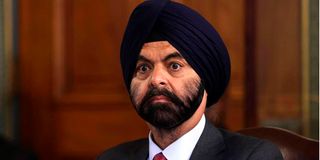Tanzania, Rwanda picked for clean energy pilot

World Bank President Ajay Banga. PHOTO | AFP
Tanzania, Rwanda and Somalia are among four countries selected as pilots of a new World Bank clean energy programme that is set to benefit at least 100 million people in Sub-Saharan Africa by 2030.
Sao Tome and Principe will also take part in the rollout of the Accelerating Sustainable and Clean Energy Access Transformation (Ascent) programme, which will be expanded to 20 countries in the region over the next seven years.
World Bank Group President Ajay Banga announced the $15 billion project during the International Development Association's (IDA) mid-term review meeting of its 20th financing round in Zanzibar.
According to Mr Banga, at least $5 billion of the funding requirement will be covered by IDA and the remaining will be from partners.
"We know it won't solve the problem of access to power for the entire continent since there are more than 600 million Africans facing the problem." he said. "But we see it as a start, and also a platform to draw more interest among IDA partners to also join the cause through similar investments."
The Bank describes the Ascent programme as a "game-changer in a region where only 48 percent of the overall population and just 26 percent in rural areas has access to electricity."
“The lack of energy access is the most significant challenge to development progress in the region today (as it) hinders economic recovery and faster progress toward poverty reduction," it says.
Effects
"It also results in significant food spoilage owing to lack of refrigeration, particularly in countries already plagued with food insecurity, and plays a role in poor health outcomes given that less than half of all hospitals in the region have reliable electricity access," the Bank said.
Victoria Kwakwa, the World Bank's vice-president for Eastern and Southern Africa, said IDA's $5 billion input will be "leveraged for an additional $10 billion" using resources from the Bank's other lending arms including the International Finance Corporation and Multilateral Investment Guarantee Agency plus contributions from public and private sector partners.
She said the Ascent programme was designed to speed up efforts to achieve the clean energy transition on a global scale by pooling global and local knowledge with a "menu-based" approach to empowering selected countries to pursue energy access goals.”
"Women, who are often disproportionately burdened by lack of energy access, will benefit the most and will also be provided additional income-generating opportunities to unleash their economic potential," the Bank said.
The programme will involve three main components; developing regional and national platforms to enable economies of scale and cost reduction strategies, expanding grid electrification through investment and technical assistance, and financing strategies to improve energy access for households, enterprises, farmers, schools, health clinics and other social needs.




